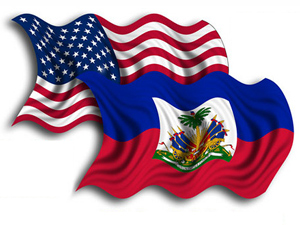The Haitian Diaspora and Dual Citizenship: A Question of Survival
By Roger A. Muhammad -Guest Columnist- | Last updated: Oct 3, 2012 - 12:04:46 PMWhat's your opinion on this article?

|
As far as Mr. Jean’s rejection for the presidential bid was concerned, the CEP maintains that it based its decision on the 1987 Haitian Constitution.
More recently, in March 2012, this issue was reignited when President Michel Martelly was also questioned about an alleged dual citizenship. His critics accused him of being both a U.S. and Haitian citizen which, based on the Haitian Constitution—a Constitution that President Martelly is now trying to modify—would disqualify him from office.

Wyclef Jean (center), Haitian-born singer; Matt Damon (second from left), actor from the United States of America; and Frank McKenna (second from right), Premier of the province of New Brunswick in Canada, assess damage caused by tropical storms, as part of Jean’s foundation’s Yele Haiti aid activities. Photo: UN Photo/Marco Dormino
|
It is in that context that we should, in part, understand why the controversial provision in the Haitian Constitution came to exclude the possibility of ‘dual citizenship’ for its Diaspora. It was meant, in a sense, as a self-protecting mechanism against foreign influence (i.e. United States or France).
But many things have changed since. For one, over the past few years, Haitians abroad have been sending more money each year to Haiti than all foreign aid donations combined. Moreover, the Haitian population at home suffers from severe poverty and illiteracy has become the norm for over 60 percent of the country. Thirdly and most importantly, since January 12, 2010, the country’s capitol, Port-au-Prince, is still mostly in rubble and at least 350,000 people still live in tents as we are writing this article.
These factors critically call for revision of this constitutional feature, for it has clearly shown itself to be defunct and unable to meet the formidable new challenges that Haiti is facing today.
In that respect, why not consider Israel as a model? (Yes, I know what I just wrote.) While we can strongly disagree with the means by which Zionism managed to acquire the land of Israel, we have to admire the systematic and highly organized way in which the Zionist Movement pooled the resources of its powerful Diaspora to build its (stolen) land into a world superpower.
Putting aside, again, the cruel and unjust treatment of the rightful owners of this land, the Palestinian People, Haiti should nonetheless consider the method of Zionism in the way it could organize and make the most of its powerful Haitian Community living abroad.
While the Haitian population is plagued with illiteracy, the Haitian Diaspora is comprised of so many educators, lawyers, engineers, doctors, business persons, computer scientists and a host of brilliant intellectuals.
Can Haiti really afford to simply dismiss such an invaluable resource? Can it afford to politically alienate a constituency that can provide, potentially, the only economic and professional weight that can balance the overwhelming power of Haiti’s oligarchic and suppressive elite? Objectively, no it can’t.
If we look at the kinds of programs established for the Jewish Diaspora to cultivate support for the homeland, we can learn much. For example, Israel has well established programs for the Youth in the Diaspora to come in the country for two years in order to immerse themselves in the culture, religion, politics and economics of their (stolen) land.
Young Haitians should, as Israeli children do, partake in Patriotic Excursions to Haiti; spend a summer there to help rebuild homes; visit the great historical sites of the Revolution; go to Saturday schools where they learn all about their glorious history, not only in Haiti but going back to Ancient Egypt and beyond.
In 1999, Israel established a Ministry of Social and Diaspora Affairs, which is now merged with the Ministry of Information (2009) and called the Ministry of Information and Diaspora. This Ministry is part of the Israeli cabinet and works to enhance relations and coordination with their Jewish Diaspora. Haiti has every reason to do the same!
Haitian Political-Economic Think Tanks and Intellectuals outside of Haiti should gain more access to the Government of Haiti. Discussion Forums on Haitian Dual Citizenship should be held and coordinated all throughout the Diaspora and large conferences should be convened. Pressure should be laid on the Haitian Government to amend this aspect of the 1987 Constitution, with clear political and economic arguments to support their stance. As Wyclef Jean told reporters in 2010, “The future is dual citizenship.”
In truth, Wyclef Jean did more than just run for president; he started a movement, perhaps even a process. From a biblical perspective, we could say this movement is styled after the story of Nehemiah, the cup-bearer of the Persian King Artaxerxes I. During the first period of Nehemiah’s governorship, the walls of Jerusalem (Port-au-Prince) were rebuilt. In his song, Rivers of Babylon, a song dedicated to Haiti, Wyclef writes: “By the rivers of Babylon, there we sat down yeah we wept, when we remembered Zion.”
What link actually might exist between the prophetic Nehemiah and Wyclef Jean I leave for others to dissertate. The real point I wanted to make was that the time for the Haitian Diaspora to remember their Zion, Haiti has arrived (and is long overdue). It is time for this great people to reclaim its destiny and the land that belongs to them.
To quote from Jewish Zionist literature, HaKadosh Rabbi Yissachar Teichtal, from Hungary, who wrote in 1944 (Em HaBanim Smeich p.67-68): “If the Redemption were to occur in good, peaceful times, when quiet prevailed among peoples many of our Jewish brethren would not want to leave the Exile; for what would they be lacking there? … therefore, these calamities come upon us in order to awaken us to return to our Holyland.”
To conclude with the Words of the Honorable Minister Louis Farrakhan: “Haiti is in trouble today. And even in spite of differences, the bigger picture is Haiti. We have to come together around Haitian leadership; and over the long term, help rebuild Haiti.”
Let us reflect on these words and remember what the Minister always taught us, that organized lies are more powerful than a disorganized truth.
INSIDE STORIES AND REVIEWS
-
-
About Harriett ... and the Negro Hollywood Road Show
By Rabiah Muhammad, Guest Columnist » Full Story -
Skepticism greets Jay-Z, NFL talk of inspiring change
By Bryan 18X Crawford and Richard B. Muhammad The Final Call Newspaper @TheFinalCall » Full Story -
The painful problem of Black girls and suicide
By Charlene Muhammad -National Correspondent- » Full Story -
Exploitation of Innocence - Report: Perceptions, policies hurting Black girls
By Charlene Muhammad -National Correspondent- » Full Story -
Big Ballin: Big ideas fuel a father’s Big Baller Brand and brash business sense
By Bryan Crawford -Contributing Writer- » Full Story






 Click Here Stay Connected!
Click Here Stay Connected!








